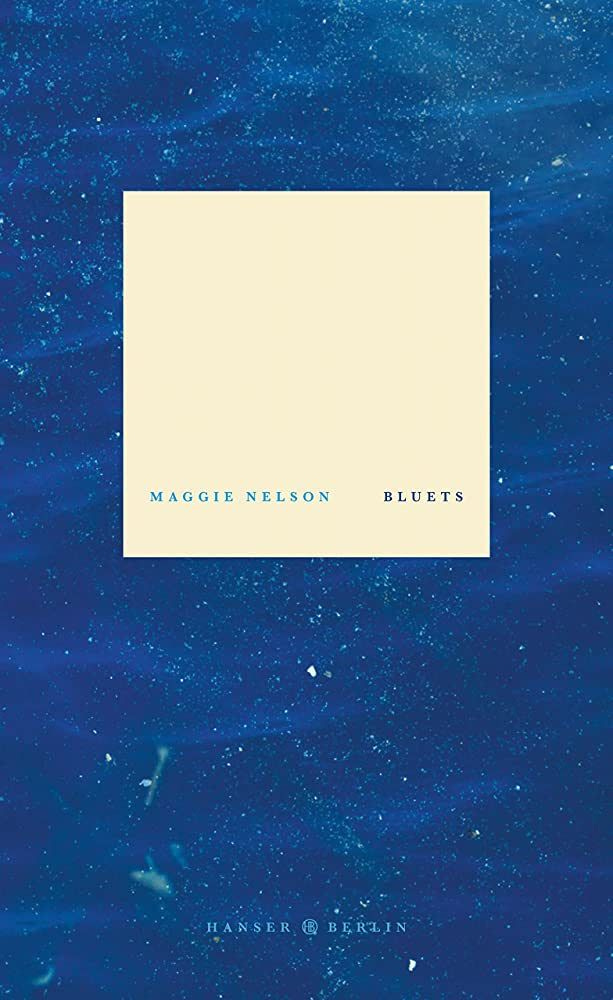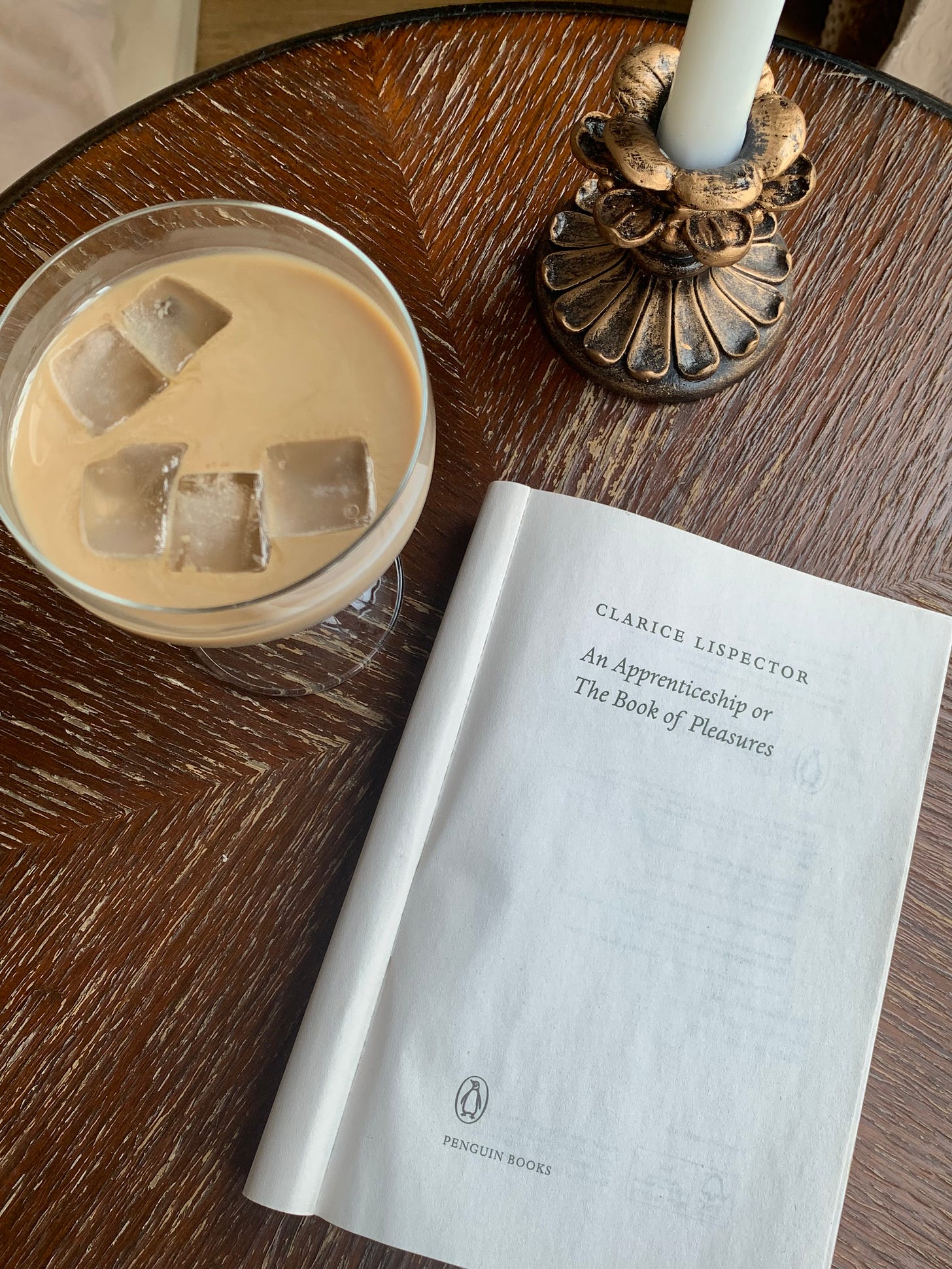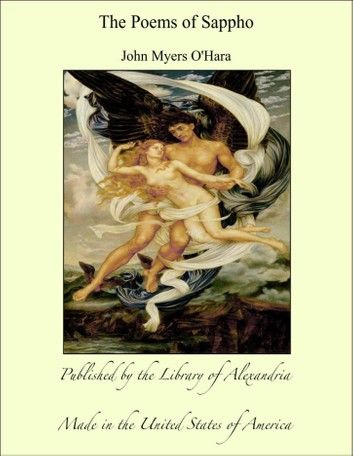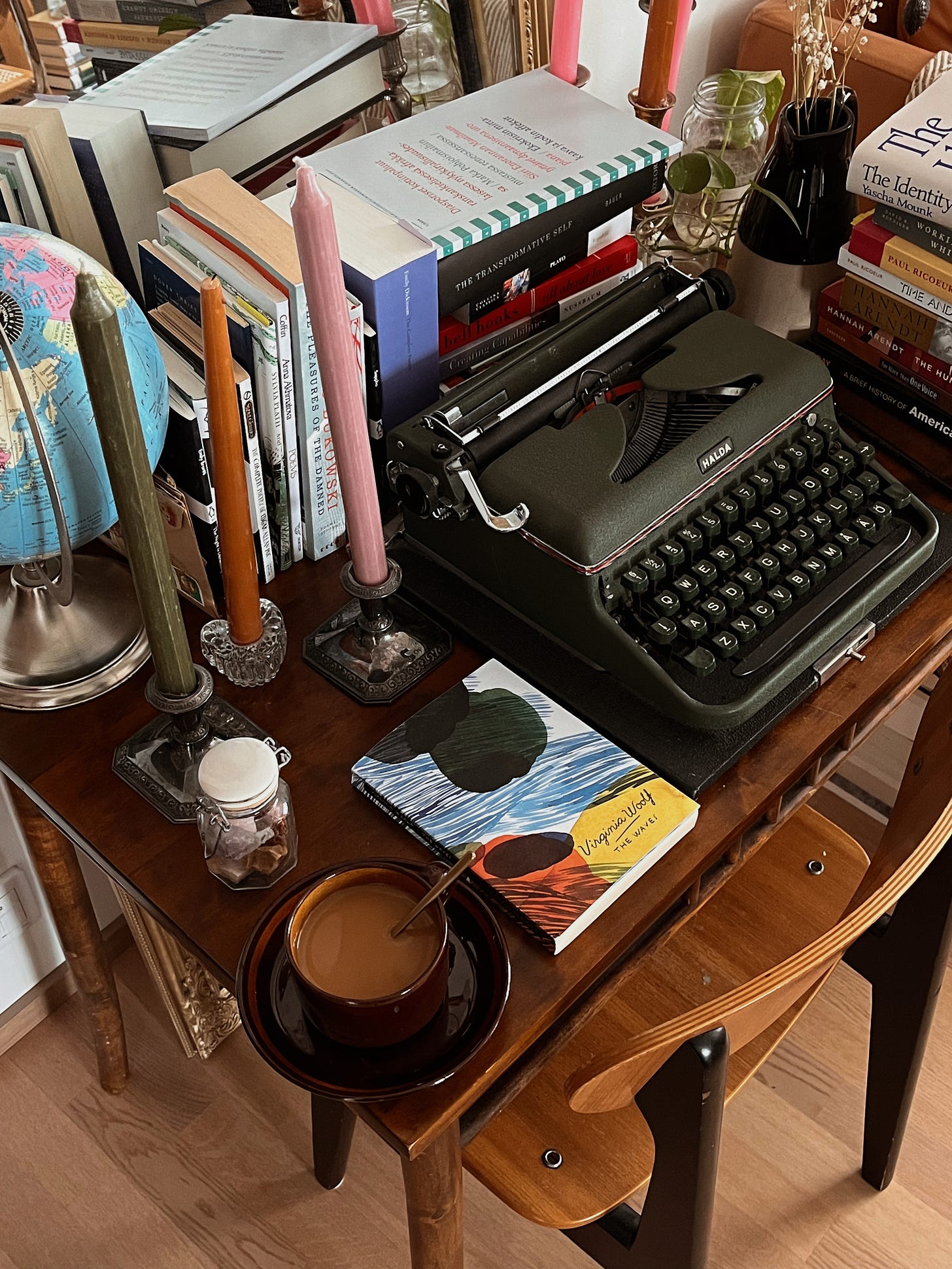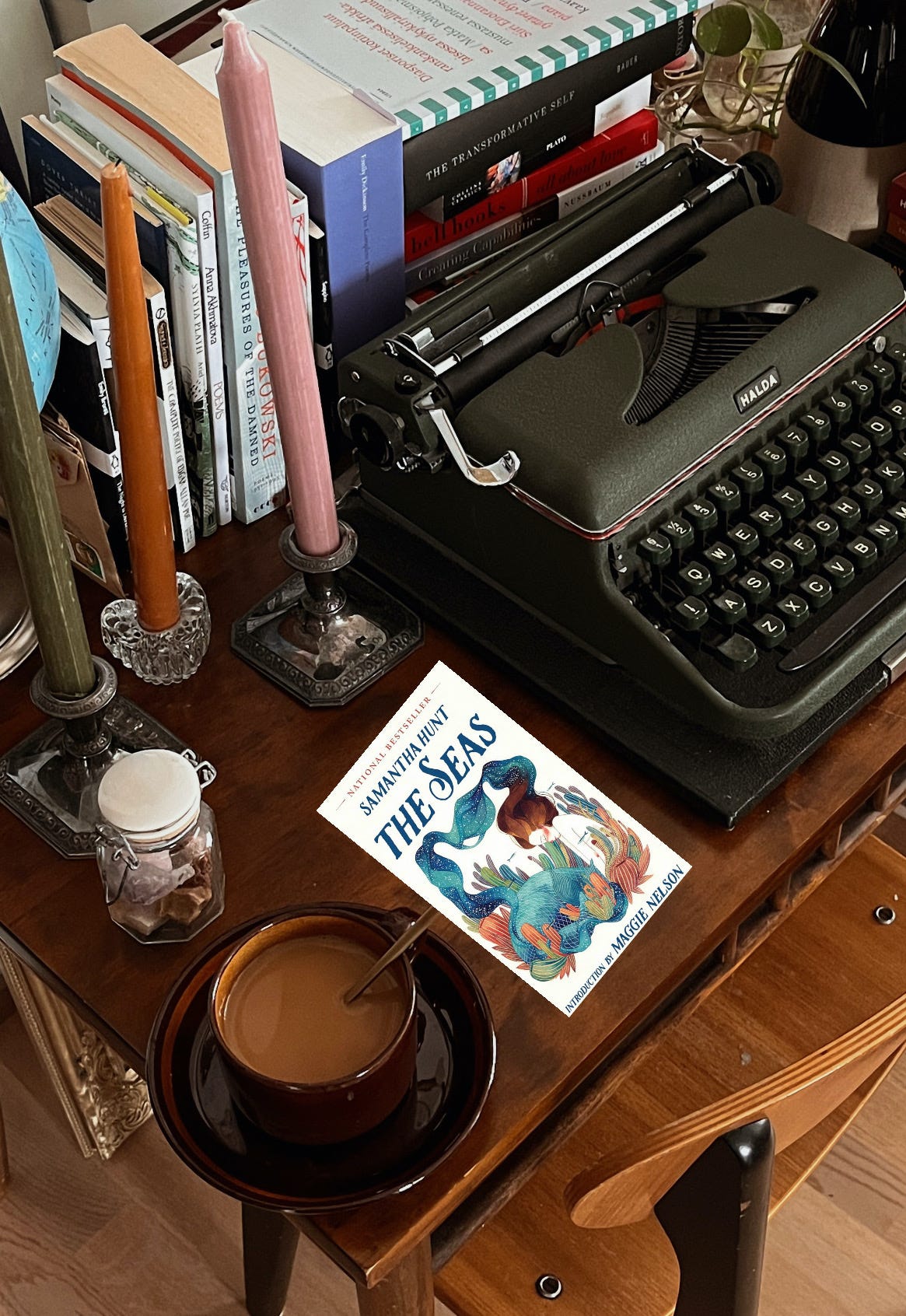To get a deeper sense of Tender Philosophia’s vibe, we’d each like to recommend 4 tender and philosophic books. Although in case you haven’t noticed, every book the Tender Philosophia book club has read so far has fit the Tender Philosophia vibe. There are so many books out there that we think tender philosophers would like, but we’ve managed to narrow it down to 8….for now. If you like these books, you’ll like Tender Philosophia, and vice versa.
Bluets by Maggie Nelson
“I want you to know, if you ever read this, there was a time when I would rather have had you by my side than any one of these words; I would rather have had you by my side than all the blue in the world.”
One of my all-time favorite books. I’ve surprisingly never written a review for this book I so dearly love yet. So here goes.
Bluets is a weeping bluebell, a whirlpool of sadness, a painstakingly-done collage. It’s a collection of achings told in exactly 240 stanzas or vignettes. It’s the first book I read in adulthood that reminded me there are so many forms of writing out there and that I don’t have to conform.
Bluets is a multi-year-long diary entry of sorts that reflects Nelson’s love of the color blue and everything that has to do with it, from birds to words to her deep blue longing. Quoting Goethe, Emerson, Gertrude Stein, and the meaning of pharmakon, it is unquestionably clear that Nelson is a brilliant scholar and thinker.
While reading Bluets I was delightfully unprepared for the level of eroticism, writing in the margins of my epub that I would have read it sooner if I had known. Yet there was also the heartwrenching story of Nelson’s friend. An accident left her a quadriparalytic and in some vignettes, Nelson tells us about her pain and the care with which her friend’s lover treats her. Her bottomless grief pours through the pages.
Bluets is a sad woman’s book, Bluets is a thinker’s book. Bluets is a book for a tender philosopher.
An Apprenticeship or the Book of Pleasures by Clarice Lispector
“Lóri would sometimes feel a longing so enormous that it was like hunger.”
“With me you’ll speak your whole soul, even in silence. One day I’ll speak my whole soul, and we won’t run dry because the soul is infinite. And besides we have two bodies which will be a joyful, mute, deep pleasure for us.”
I recently read it for the first time, my first Lispector, and I couldn’t help but share two quotes from this book. I don’t know what to say except that reading it felt like a meeting with my soul. Or maybe not a meeting, a meeting sounds too formal. A union? A gathering?
The most tender parts of my soul were reflected back to me in Lispector’s pages. Things that are so obvious inside of me which Lispector expresses so simply yet so eloquently. She truly does write as if she invented writing.
An Apprenticeship or the Book of Pleasures paints a tender tale of love. Lóri, a primary school teacher, falls in love with Ulisses, a professor of philosophy. They are both afraid of loving and being loved.
But to explain it this way dilutes the potency of the story and of Lispector’s writing. When it comes to An Apprenticeship, I say forget about plot—it’s the essence of the book that matters.
Even though I read An Apprenticeship or the Book of Pleasures months after we finished the final manuscript of Tender Philosophia, it is in its DNA, for I crave and I hunger like Lóri for the things I thought were too good for me.
Eros the Bittersweet by Anne Carson
“The words we read and the words we write never say exactly what we mean. The people we love are never just as we desire them. The two symbola never perfectly match. Eros is in between.”
Did you know there was such a thing as the geometry of a poem? Carson explains the triangular figure of Fragment 31 and how it is shaped by jealousy. I always learn something new when I read Carson’s works. She breaks down everything we think we know about words and concepts. Have you ever thought about the structure of desire? Carson clearly has. This is a reworked version of her PhD dissertation after all.
In Eros the Bittersweet, Carson prompts us to ponder the presence of Eros in various classical texts, cicadas for an entire chapter, and even the way literacy transformed our understanding of desire—she gives us a map of desire.
Eros the Bittersweet is not a light read, but it’s the perfect tender and philosophic read if you want to get into the inner workings of why we want.
The Poems of Sappho trans. John Myers O'Hara
“Saw the face immortal, and daring greatly / Raised my eyes to hers of unfathomed azure / Drank their world's desire, their limitless longing / Swooned and was nothing.” — Sappho, The Daughter of Cyprus
O’Hara’s translations of Sappho’s poems were my first foray into Sappho’s poetry. And, as I mentioned in my Sappho review in May, “I think she was the poet who got me into poetry—both reading and writing it.” I am the poet that I am today because of her.
Sappho was from the island of Lesbos (yes, that’s where the word ‘lesbian’ comes from). She wrote about desire and her love of women so vividly. It makes my heart weep to think that I may never truly grasp Sappho’s intent in her poetry because ancient Greek is foreign to me.
The Poems of Sappho is a must-read for the tender philosopher. After all, in its essence, Tender Philosophia is brimming with the same type of intense yearning.
<3 D
The Waves by Virginia Woolf
“For soon in the hot midday, when the bees hum around the hollyhocks, my lover will come.”
The Waves is everything, everywhere, all at once. The narration flows like a wave, like the wind, like a moth moving from place to place, person to person, finding what unites us and what makes us unique. It's about life, identity, and of course, love. For someone like me who studies narratives and identities in her research, this book feels like a jewelry box filled with precious delights.
It asks for your patience and should not be rushed. Woolf offers tender moments where the characters grow fond of each other, but primarily, I’d call this a philosophical read. It makes you question your idea of the self, something that always draws me in.
This is the book for anyone whose inner monologue flows like a force of nature, where light and shadow dance in a dreamy rhythm.
The Seas by Samantha Hunt
“If one word can mean so many things at the same time, then I don’t see why I can’t.”
The Seas is a beautiful and raw story about grief, yearning, and the search for identity. It explores war and mermaids, language and lust. Just as our bodies are made of water, the language in this novel is made of meaning; it flows and changes with time.
The story can be read as magical realism or simply as a portrayal of a person's mind trying to find footing in their grief. Sometimes there is no solid ground, and the best you can do is ride the waves.
The main character, a teenage girl, desires an older man. This desire is vivid and intense. Hunt's depiction of yearning is dramatic and dire; it demands to be heard. With its dreamlike atmosphere and fantastical longing, this is a book for all of us tender philosophers.
The Well of Loneliness by Radclyffe Hall
“Stephen had loved this spot from her childhood, and now she instinctively went to it for comfort, but its beauty only added to her melancholy, for beauty can wound like a two-edged sword. She could not respond to its stillness of spirit, since she could not lull her own spirit to stillness.”
The Well of Loneliness is a tender read. It tells the story of Stephen, a woman who loves women. The novel was banned upon publication for obscenity, though there is nothing but beauty (and melancholy) in it. It remains one of the most famous and important lesbian novels.
The novel made me weep countless times with its depictions of loneliness and longing. Stephen desires so much from life, yet everything seems forbidden. Her only solace comes from her beloved horse and the natural world around her.
For its tender themes, it is a perfect classic for anyone who has ever felt alone in their loving—whose love has been denied for any reason, and whose identity exists beyond explanation.
Night Sky with Exit Wounds by Ocean Vuong
“Summer in the mind.
God opens his other eye:
two moons in the lake.”
Ocean Vuong is one of those writers whose words feel like pure magic. It seems as though anything he writes could instantly become a classic. His perception of the world feels real, yet somehow extraordinarily beautiful.
There is a tenderness in the way he writes. His words feel like the musings of someone deep in thought, perhaps even in solitude. His metaphors flow effortlessly, complete and heavenly, deeply philosophical.
I believe anyone could benefit from reading Vuong’s work. He addresses important topics with such grace and care, making his writing both poignant and powerful.
<3 J
If any of these books speak to you, add Tender Philosophia to your TBR on Goodreads and keep your eyes peeled for our release date on December 5, 2024!





